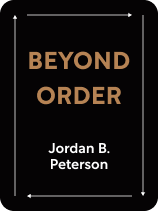

This article is an excerpt from the Shortform book guide to "Beyond Order" by Jordan Peterson. Shortform has the world's best summaries and analyses of books you should be reading.
Like this article? Sign up for a free trial here.
Do you tend to resist change or rebel against tradition? What approach should you take toward old ways and new ideas?
Do not carelessly denigrate social institutions or creative achievement. That’s the first rule that Jordan B. Peterson lays down in his book Beyond Order. He explains why this is a good attitude to keep and provides some cautions for taking either tradition or progress to an extreme.
Read on to learn about Peterson’s Beyond Order Rule 1.
Respect Social Institutions & Creative Achievement
Starting with a discussion of the world at large, Peterson states this with Beyond Order Rule 1: Do not carelessly denigrate social institutions or creative achievement. These are complementary forces: Traditions ground us and connect us to the past, while creative thought challenges and renews facets of society that have stagnated.
According to Peterson, our traditional social institutions are solutions to complex problems that humanity has spent millennia working on: How we can best structure our societies, organize large-scale actions such as building cities, live together in a civilized, non-violent way, and so on. Though at times they may seem anachronistic, they serve to keep human civilization in good order.
At the same time, all traditions are prone to becoming dogma—rigidly following old ideas even when they’ve become outdated. In time, Peterson says, dogma falls away when creative thinkers challenge the flaws in an existing status quo and improve upon them. In this way, creative change counteracts the eventual decline of traditional ideas and ways of living.
Peterson argues that, since these forces—tradition and change, conservatism and liberalism—work together to keep society balanced and moving forward, we should respect both of them. If one is missing, we risk falling to either extreme:
- At one extreme, conservatism becomes stagnant and corrupt—unable to handle a changing world. For instance, Puritan fundamentalists didn’t make it to today.
- At the other extreme, liberalism can lead to totalitarian ideologies that crucify offenders. For instance, Marxist ideas were originally liberal and progressive but gave rise to governments such as the Soviet Union that weren’t so open-minded.
According to Peterson, today’s conservative dogmas were once new, and today’s ideas will one day become conservative dogma. In the end, both matter.
| Hegelian Dialectics and the Evolution of Ideas Peterson’s above argument is reminiscent of the German philosopher Georg Wilhelm Friedrich Hegel’s notion of dialectics. Hegel explained dialectics as a process through which ideas, concepts, and social systems evolved through conflict and resolution: • The process begins with a thesis, the starting point for an idea. • Then, an antithesis—an idea that conflicts with or challenges the thesis—arises in opposition, and the two ideas clash. • Through this conflict, a synthesis emerges—an idea that combines elements from both thesis and antithesis, producing a resolution to their tension. For example, there are various theses and antitheses conflicting between the conservative and progressive parties of US politics: arguments for and against gun rights, for and against women’s rights to abortion, and for and against welfare programs such as universal basic income. If a resolution arises to one of these conflicts, that idea will be a synthesis. The dialectic process would then continue, with each synthesis becoming the new thesis, leading to a continuous evolution of ideas and systems, such as the traditional institutions and new ideas that Peterson describes. This process of clashing and evolving ideas doesn’t just occur in politics, either. Recently, an antithesis has arisen to challenge the conventional scientific notions of reality and our place in it (that life is a statistical fluke, entropy will turn everything to dust, and humans are essentially tiny and meaningless in the grand scheme of things). In The Romance of Reality, Bobby Azarian argues that in fact, cutting-edge research suggests that life is deeply imbued with meaning, that humans are creative agents with an important role to play in cosmic evolution, and that life is statistically probable. Much as Peterson says, old ideas and dogmas come into conflict with new ones—even in an institution dedicated to finding objective truth. |

———End of Preview———
Like what you just read? Read the rest of the world's best book summary and analysis of Jordan Peterson's "Beyond Order" at Shortform.
Here's what you'll find in our full Beyond Order summary:
- A no-nonsense guide to navigating the chaos of our difficult world
- How and why you should listen to your conscience
- How to show up for life as fully as you can






